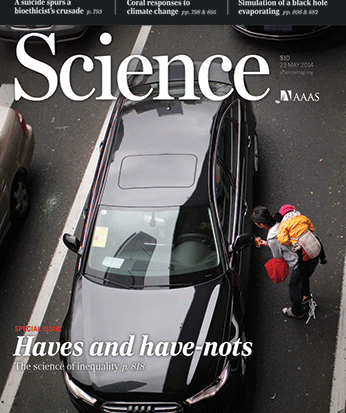
By George B. Kauffman

Income inequality, both globally in general and in the United States in particular, has been receiving increasingly accelerating attention recently as the disadvantaged 1% protest against society’s rich minority in the form of marches, demonstrations, rallies, occupations, strikes, walkouts, pickets and boycotts, as well as demands and oppositions expressed on social networking and microblogging services like Facebook and Twitter.
On April 28, Pope Francis took a hard stance against inequality in a tweet, “Inequality is the root of social evil,” sent from his official Twitter page. The tweet almost immediately received 17,686 retweets and 14,321 favorites. It’s unclear if the Pope’s warning was weighing in on the fervor sparked by French economist Thomas Piketty’s current bestseller, Capital in the Twenty-First Century, but the tweet’s timing—only days after the book sold out on amazon.com, where it is now the bestselling book in the United States—may suggest the Pope’s support for Piketty, who asserts that an unregulated free market creates an ever-widening wealth gap.
The Pontiff’s warning came only months after he called unfettered capitalism “a new tyranny” and urged global leaders to fight growing income inequality in his first major written work as pope. He laid out the platform for his papacy in an 84-page document last Nov. 24, attacking the “idolatry of money” and calling on politicians to guarantee all citizens “dignified work, education and healthcare.”
Not surprisingly, Democrats are increasingly focused on income inequality, and that may be nothing more than a reflection of representative government. According to new research by The Atlantic’s Richard Florida, Democrats in Congress center on legislation that targets income inequality because voters who elect them live in cities that face the most severe inequality.
Few Americans have done as much to accelerate economic inequality as much as Goldman Sachs CEO Lloyd Blankfein. Goldman paid its bankers an astonishing average of $383,000 in 2013—more than eight times the median income—after profits for the year rose by 5% to $8 billion. Blankfein himself receives $2 million in salary, on top of the tens of millions he often earns in bonuses. However, even Blankfein worried that inequality is a big problem during an appearance on CBS This Morning on June 13. He argued that one way to fix income inequality is to grow the economy. But he also acknowledged that “too much of the GDP of the country has gone to too few of the people.” He also stated that “if you grow the pie but too few people enjoy the benefits of it, the fruit, then you’ll have an unstable society.”
However, concern with inequality has not been limited to the political, social and religious realms. In what I think is an unprecedented action for a scientific journal, Science, the flagship weekly magazine of the American Association for the Advancement of Science (AAAS), the world’s largest general scientific society, included in its May 23 issue a special section, “Haves and have-nots: The science of inequality.” (See more about the special section in the sidebar to this article.)
Piketty is undoubtedly the most famous—and controversial—author in the issue. Economist Paul Krugman called Piketty’s Capital in the Twenty-First Century “the most important book of the year, maybe of the decade.” On May 29, Bloomberg Business Week ran the article, “Pickettymania: Why America Has Wealth Inequality Fever,” and Piketty was interviewed on Charlie Rose on June 13.
In his editorial in the issue, Angus Deaton admits the complexity of the inequality problem:
The distribution of wealth is more unequal than the distribution of income, and very high incomes will eventually pupate into very large fortunes, ultimately leading to a hereditary dystopia of idle rich. Piketty calls this “patrimonial capitalism,” a state that is certain to occur if the rate of return to wealth remains higher than the rate of growth of the economy. This has been true for much of history and raises the question of whether extreme inequality is inevitable. It shouldn’t be.
*****
George B. Kauffman, Ph.D., chemistry professor emeritus at California State University, Fresno, and Guggenheim Fellow, is a recipient of the American Chemical Society’s George C. Pimentel Award in Chemical Education, the Helen M. Free Award for Public Outreach and the Award for Research at an Undergraduate Institution, and numerous domestic and international honors. In 2002 and 2011, he was appointed a Fellow of the American Association for the Advancement of Science and the American Chemical Society, respectively.
Science Special Section
*Some of the items in the special section, written by Science correspondents and authorities from the United States, the United Kingdom, Canada, France, China and Switzerland, are as follows:
- The ancient roots of the 1%
- Don’t blame farming; inequality got its start among resource-rich hunter-gatherers
- Our egalitarian Eden
- If the poor will always be with us, an analogy to the second law of thermodynamics may explain why
- The distribution of wealth between and within countries stems from progress in health and wealth that began 250 years ago
- Inequality in the long run: Everything you wanted to know and weren’t afraid to ask about income and wealth (by Thomas Piketty and Emmanuel Saez)
